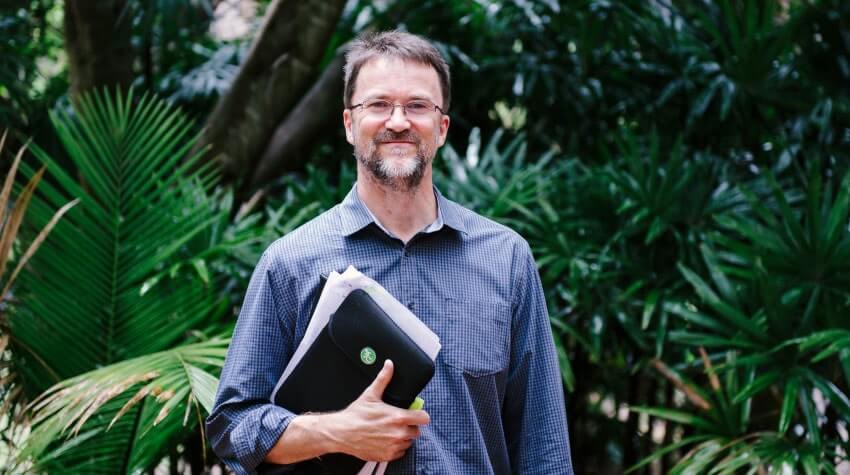Having experienced significant vision loss through her adolescence, Nikki Andersen is using her restored sight to help others see the future. As a librarian at UniSQ and a public speaker, she is focused on making the UniSQ library, and others around Australia, accessible and inclusive spaces.
A time of challenge
Nikki Andersen was diagnosed with Stickler Syndrome at the age of two. It’s a rare condition characterised by eye abnormalities, hearing loss, and joint issues. After experiencing various associated difficulties throughout her childhood, including spinal surgery, Nikki additionally lost most of her eyesight from a retinal detachment throughout her high school years. Her eyesight was worse in her final year of high school, and she experienced varying degrees of vision loss, including periods of blindness.
'That year was a real challenge. I had to take each day at a time and I was lucky to have great friends and good teachers. I often stayed up until 2 or 3am studying, and eventually experienced chronic fatigue because I needed to work so much harder. I was encouraged to enrol in the special needs class with but I resisted. I had wanted to stay in the mainstream course . I was determined to gain a good OP - which I was so proud to achieve at the end of the year.'
Nikki went on to pursue a Bachelor of Arts, majoring in writing, here at UniSQ. Then, at 21, a high-risk surgery would restore her vision. The operation carried the danger of going completely blind, and didn’t pass without complications.
'When the bandage was removed from one eye, I could only see white. It was the scariest moment of my life. Thankfully, it was fixable and the operation worked! I was so proud of my team of doctors - they took a huge risk.'
Kicking on at UniSQ
With a new lease on life, Nikki began an online postgraduate degree in Information Technology and Librarianship at Curtin University. She did her library prac placement at UniSQ, and we offered her a contract job throughout the placement. As a result of her talent and efforts, Nikki is now a valued and respected librarian at the University. She has added a Graduate Certificate of Education to her academic achievements, and has also pushed past her comfort zone to pursue public speaking opportunities. As for her eyesight, it is the best it’s ever been.
When asked why she chooses UniSQ, Nikki reflects on our supportive and welcoming culture, and the development opportunities and flexibility she’s experienced.
'I’m comfortable to be my authentic self here, and I feel valued for who I am. UniSQ invests in me. I’ve had other jobs where I felt I couldn’t be open about my medical requirements. When I first joined UniSQ, I was hesitant to disclose my disability. But everyone has been so supportive - people check in on me, and offer to help - like typing up hand-written notes for me to easily read.'
She continues, 'I’ve also been involved in UniSQ’s AccessAbility network. I haven’t experienced this kind of support in other workplaces.'
A self-proclaimed introvert, Nikki has begun presenting publicly at the Queensland State Library on the topic of inclusive libraries. She also recently presented at the New Librarians’ Symposium in Adelaide.
'I aim to offer hope for people living with disabilities. I try to be personal while also offering practical take-aways. For example, I share ideas on how workplaces and libraries can be more accessible, such as providing materials in a variety of mediums (e.g. in a particular font and colour, or using audio or braille).'
Advice on embracing disability
Nikki shares three pieces of advice to others striving to achieve their dreams while living with a disability.
- Find ways to take ownership… and grab opportunities to grow
'When I lost my vision at 16, I fell into a depressed state of mind but I’ve learned to take ownership of my situation. I decided to change how I perceive my abilities. Instead of believing that I can’t do things, I’ve started to find ways that work for me. It’s important to step out of your comfort zone - especially when fear is holding you back. Even if you’re scared, just do it. You get so much growth from being uncomfortable.'
- Don’t be afraid to ask for help - everyone needs a hand
'When we think of disability, we think of ‘dependent’ people. But at the end of the day, everyone needs support. I think the concept of independence is a myth. When I first started public speaking, I wouldn’t feel confident enough to ask for a hand if the lectern was too high - I would stand on my tippy-toes! Now, I know exactly what I need and who is willing to support me, so I’m comfortable asking for assistance. Asking for help is just part of life.'
- Find the silver lining
Nikki says she lives by the ‘1 to 3 ratio.’ 'For every traumatic experience, I find three positive things. Disability can have a silver lining. I wouldn't be the person I am today if I hadn’t faced the challenges that I have. My experiences have made me more resilient and adaptable. I’ve also realised I now have a great memory after memorising things said in class to study for exams. I can remember a speech after reading it once or twice. And that’s a massive silver lining.'
Find out more about current career opportunities and what it’s like to work at UniSQ.



